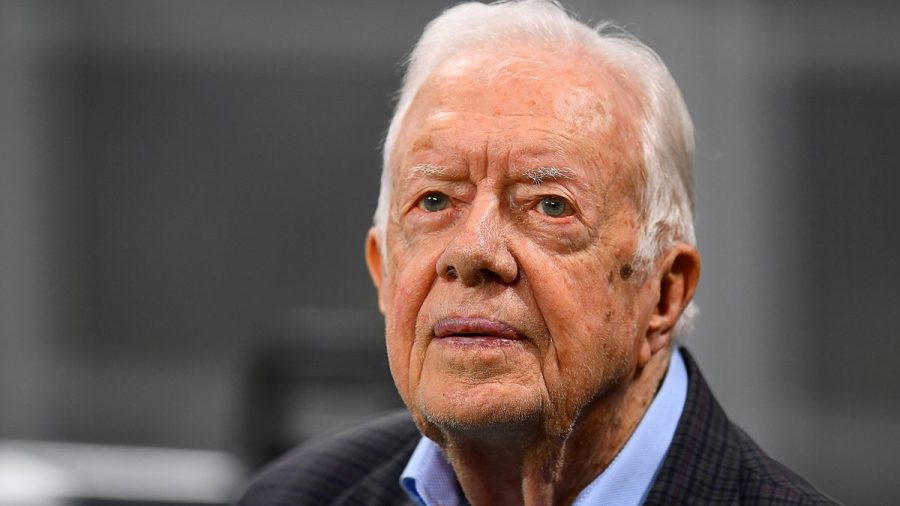Jimmy Carter: An Exemplar for U.S. Politicians
During a time when we only focus on the negative aspects of our politicians, there is one politician we should all look up to for his kindness and service to others: former President Jimmy Carter.
The Carter Center announced that Carter, now 98 years old, has decided to enter hospice care surrounded by the support of his family. He will certainly leave an important mark on the history of the United States, but the question is, what type of legacy will that be?
Carter’s presidency from 1977 to 1981 had its achievements, such as efforts to improve the environment, the creation of the Department of Education and, internationally, the Camp David agreements to promote peace between Egypt and Israel.
However, despite these successes, Carter’s presidency was far from perfect. His presidency has usually been remembered more negatively, particularly for his handling of the Iranian hostage crisis, which eclipsed his administration’s accomplishments. He was voted out of office after one term, and Ronald Reagan’s landslide victory has forever tainted his reputation. As time has passed, more Americans have started to recognize Carter was dealt a bad hand during his presidency, including author Jonathan Alter, who called Carter “the most misunderstood president”. Despite this, his failures will probably always be at the forefront of discussions.
After leaving the Oval Office, Carter had something that not many other former presidents have: a prominent and important post-presidential career. He couldn’t make the long-lasting, meaningful impact he would have wanted during his four years in office, but he did during his post-presidency. You could be a Republican, Democrat or neither, but you cannot deny that Carter’s dedication to philanthropy and human rights is monumental and meaningful. Arguably, he has done more good for this country and the world than many American politicians. He sought to do this during his four years in office, but when he couldn’t, he decided to devote the rest of his life to causes that he cherishes. This is admirable; he could have taken the paycheck once he left office and retired, but he saw that there was still work to be done and persisted in making a difference.
There are so many of his post-presidential accomplishments that I cannot list them all, but here are the three that I believe are the most impressive and showcase his kindness and commitment to the good of all people.
First, he established the Carter Center in 1982, an organization dedicated to resolving conflicts such as human rights and health. The center’s achievements have been impressive and include the near eradication of the Guinea Worm. The center reported an all-time low of merely 13 cases worldwide in 2022.
Second, he has remained active in international relations. In 1994, he was involved in the first peacemaking efforts between the United States and North Korea in 40 years, which led to North Korea’s agreement to denuclearize. He remained passionate about such negotiations in 2019 when he volunteered to travel to North Korea on behalf of former President Donald Trump. Even though he did not belong to the same political party as Trump, his suggestion showed that he was willing to put political and personal differences aside for the safety and good of other countries. It’s a shame that there are many American politicians who cannot do the same.
Finally, he and his wife, Rosalynn, have dedicated their lives to volunteering throughout the United States. They have formed a partnership, the Carter Work Project, with Habitat for Humanity to combat the issue of affordable housing, where they have volunteered for over 35 years. Even in his old age, he cared about going forward and helping the most vulnerable populations.
All of these successes and more earned him the Nobel Peace Prize in 2002, one of only four U.S. presidents to do so. And this is why Carter is unlike most politicians. Every decision he made during his post-presidential career has kept human rights in mind. His work shows that he prioritized making a difference during and after his presidency; the power and prestige were never priorities. This isn’t to say that politicians do not care about the problems in and outside of the United States, because I’m sure many of them do. But when most debates among former and current politicians consist of personal attacks and corruption, it’s not unreasonable to assume that they do not have our best interests. Meaningful change requires years of hard work and dedication, and all politicians, especially former presidents, should follow Carter as an example, with or without the titles of “senator,” “representative” or “president.”
If I had to name the most important takeaway from Carter’s life, it would be that your past mistakes do not always define you. If you are committed to making a difference, even if you failed at first, you should dedicate yourself to the causes you care the most about, with or without the power. He may not have been the perfect, ideal president for many Americans, but he was a phenomenal activist, philanthropist and, most importantly, human. That, in my mind, will be his legacy.
Nora Leach, FCRH ’24, is an English and American studies major from Groton, Mass.













































































































































































































